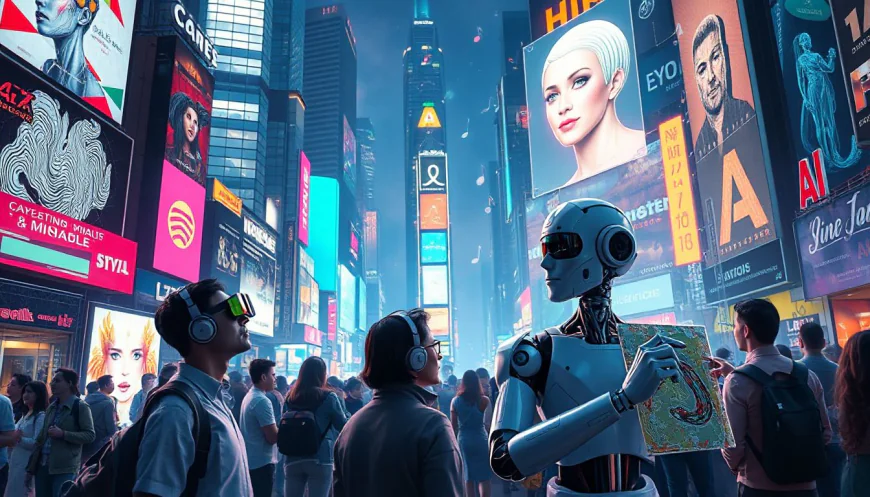AI in Pop Culture: From Deepfakes to AI-Generated Music—Exploring How AI is Reshaping Creativity and Identity
AI is everywhere. It’s moving beyond tech labs into movies, music, and social media. Suddenly, it’s changing how we see ourselves and the world around us. AI-driven tools are giving creators new powers, but they’re also raising questions about what’s real. This mix of innovation and concern is making pop culture a wild new frontier.

How AI Is Transforming Creative Industries
The Rise of AI-Generated Content in Music, Film, and Art
Tools like OpenAI’s Jukebox can craft entire songs without human hands. DeepArt uses AI to turn photos into art in seconds. Content creation is no longer slow or expensive. Artists can make album covers, grooves, or movie scripts faster than ever.
Imagine a band making music with an AI partner or a filmmaker using AI to write scenes. It’s happening now. These tools help creatives push past old limits and try new ideas. AI isn’t replacing art — it’s changing how it’s made.
Disruption and Opportunities for Artists and Creators
AI opens doors. Artists can experiment with sounds, visuals, and stories they never thought possible. Some see AI as a new friend in the studio, not a threat. Others worry it might take away jobs or copy old ideas.
Copyright questions pop up: Who owns AI-created art? Can anyone claim originality? Experts see AI as a tool that makes collaboration easier, not a rival. It helps fresh talents stand out and gives veterans new ways to experiment.
Key Trends and Data
More than half of entertainment companies now use AI to create content. By 2025, AI-generated music might make up 20% of the industry’s market share. Companies are investing billions into AI tech. The future of entertainment looks like a mix of human and machine, working side by side.
Deepfakes and the New Face of Media Manipulation
Understanding Deepfakes: Technology and Techniques
Deepfakes use neural networks to swap faces or voices, making fake videos look real. They can clone anyone’s face onto someone else’s body or alter voices to say things never said. The magic — or madness — lies in machine learning. It trains computers to generate believable media that can fool viewers.
Ethical Concerns and Misinformation Risks
Deepfakes can be dangerous. They’ve been used to fake celebrities, manipulate elections, and spread false info. Imagine a politician saying something they never did — trust crumbles. These videos make it harder to tell truth from fiction.
Media literacy is now a must. We need to stay alert and question what we see online. Who created this? Why? These questions matter more than ever.
Real-World Examples
In 2018, a deepfake video showed a world leader giving a speech. The clip looked real but was completely fake. Celebrities like Tom Cruise also became targets for deepfake impersonators. Companies like Meta and Adobe are trying to build tools to spot fakes. But the fight is ongoing.
Tips for Recognizing and Combating Deepfakes
- Look for odd blinking or inconsistent lighting.
- Check the source of the video—trust only verified outlets.
- Use apps that detect AI-generated media.
- Be skeptical of unusually emotional or extreme content.
AI’s Role in Shaping Identity and Cultural Expression
AI-Driven Personalization and Cultural Content
Streaming services use AI to recommend shows you’ll probably like. It’s like having a personal curator. That shapes your tastes and even your view of the world. As AI learns our habits, it influences what stories we see and how we see ourselves.
AI Avatars and Virtual Influencers
Ever heard of Lil Miquela? She’s an AI-created influencer with millions of followers. These virtual stars are taking over social media, working with brands, and shaping trends. They’re 100% digital but seem real because of perfect design and clever storytelling.
Ethical and Social Implications
If AI can craft perfect avatars, what does that do to human connection? Can you tell if someone’s real or just an AI construct? Some argue it’s a new form of expression; others worry it dilutes authenticity. Experts in culture and ethics ask us to think carefully about these changes.
How to Engage Mindfully with AI-Influenced Pop Culture
- Question whether content feels genuine.
- Seek diverse sources of media.
- Remember that behind AI-created characters are humans making choices.
- Balance digital content with real-world experiences.
The Future of AI in Entertainment and Society
Emerging Technologies and Innovations
Latest AI tech can craft immersive stories, design game worlds, or generate new kinds of art. Soon, we might experience fully AI-directed movies or VR adventures that adapt instantly to what you want. AI might even compose symphonies or paint new styles of art — impossible to predict how far it can go.
Industry Predictions and Trends
Experts believe AI will become a staple in media within five years. Many predict a shift toward hybrid art forms, blending human soul with AI precision. Regulations will likely shape how AI is used, especially around copyright and fake media. Staying ahead means watching for new rules and breakthroughs.
Practical Tips for Creators and Consumers
- Creators should use AI responsibly, respecting originality.
- Consumers need to stay skeptical and curious.
- Keep up with tech news to understand new tools.
- Support transparent and honest content.
Conclusion
AI is shaking up pop culture, changing how we create, share, and see ourselves. It offers incredible tools but also new risks. Understanding these shifts helps us navigate this new landscape wisely. Instead of fearing AI, we can learn to use it ethically and creatively. Stay curious, stay critical, and keep exploring how AI shapes our world.



 VARSHITHA
VARSHITHA